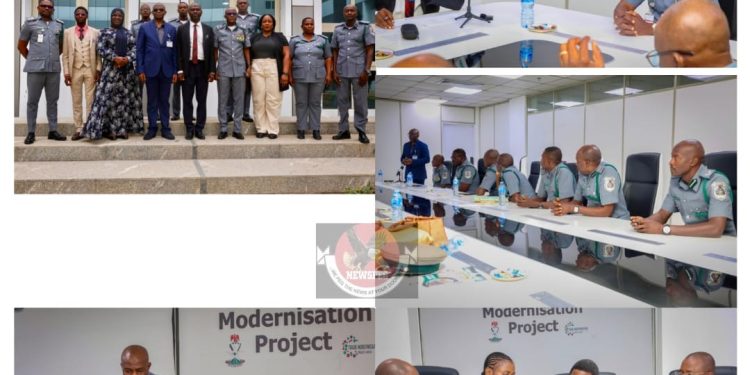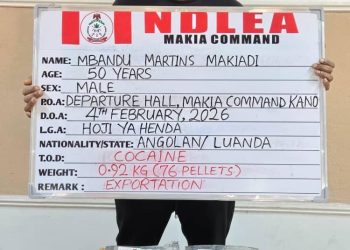By Nkechi Eze
In a significant step toward strengthening institutional accountability and promoting ethical conduct within government institutions, the Nigeria Customs Service (NCS) on Wednesday, June 18, 2025, welcomed a high-powered delegation from the Independent Corrupt Practices and Other Related Offences Commission (ICPC) at its headquarters in Abuja. The visit marked the formal deployment of two critical anti-corruption monitoring tools, the Ethics and Compliance Scorecard (EICS) and the Anti-Corruption and Transparency Unit (ACTU) Effectiveness Index (AEI).
The engagement is part of a broader national effort to entrench transparency, integrity, and ethical governance across Ministries, Departments, and Agencies (MDAs). It also reflects the strong commitment of the Comptroller-General of Customs (CGC), Bashir Adewale Adeniyi, to drive institutional reforms and enhance public trust in Customs operations through proactive anti-corruption measures.
Representing the CGC at the event, the Assistant Comptroller-General (ACG) in charge of Headquarters, Isah Umar, welcomed the ICPC team and commended the initiative, describing it as a timely and necessary oversight mechanism designed to strengthen Nigeria’s public sector institutions. He emphasised the alignment of the deployment with the NCS’s ongoing reforms, which are aimed at fostering professionalism, transparency, and accountability in line with federal anti-corruption frameworks.
“This is an important oversight process to evaluate ethics and integrity levels across government agencies,” Umar stated. “For us in the Nigeria Customs Service, it aligns with our broader reforms aimed at ensuring professionalism, accountability, and citizen-focused service delivery. We have carefully reviewed the requirements of this assessment and assembled all relevant documentation. We invite the ICPC team to critically review them, and we remain open to collaboration for continuous improvement.”
The deployment of the Ethics and Compliance Scorecard and ACTU Effectiveness Index will serve as preventive mechanisms designed to assess how well agencies are adhering to ethical standards and corruption control frameworks. The initiative is a key part of the ICPC’s annual preventive strategy targeting MDAs.
During the interactive session, Mr. Umar Sani, who led the ICPC delegation, explained that the two tools being deployed serve different but complementary functions. The EICS assesses compliance with ethical practices, transparency mechanisms, and accountability structures across four key indicators management structure and culture, financial management system, administrative system, and ACTU performance. Meanwhile, the AEI specifically evaluates the functional effectiveness of the ACTU within each agency.
According to Sani, “The deployment of the Ethics and Compliance Scorecard and the ACTU Effectiveness Index is a preventive tool to ensure MDAs, including the Nigeria Customs Service, are compliant with institutional ethics and procedures. It also evaluates transparency and accountability structures and assesses the strength of internal systems. This is not just about ticking boxes, it’s about building a system that can withstand corruption and protect public trust.”
He further highlighted the importance of ACTU structures across agencies, explaining that they play a central role in raising awareness among staff, reporting infractions, and serving as a bridge between the workforce and the ICPC in rooting out unethical behavior.
Also present at the session were senior officers of the Nigeria Customs Service, including the Comptroller of the Customs Intelligence Unit (CIU), Emmanuel Oshoba, and Comptroller Special Duties, Hannel Hadison, who reiterated the Service’s long-standing commitment to anti-corruption compliance. They noted that the ACTU has been institutionalised across all NCS commands and formations, with active desk officers monitoring ethical standards, encouraging compliance, and driving awareness on the dangers of corrupt practices.
They explained that through regular sensitisation campaigns, compliance tracking, and feedback mechanisms, the NCS has developed a culture of ethical responsibility and internal accountability.
This collaboration between the NCS and ICPC underscores a growing recognition that preventive anti-corruption tools are not just complementary to enforcement actions, but essential for institutional integrity. With corruption posing a serious challenge to Nigeria’s development aspirations, partnerships such as this are viewed as vital to building resilient institutions capable of upholding transparency and delivering quality public service.
As the engagement concluded, both parties reaffirmed their shared vision of building a public sector anchored on ethics, service, and integrity. The ICPC team is expected to analyse the documentation submitted by the NCS and provide feedback on strengths, gaps, and areas for improvement in subsequent evaluation reports.
The deployment of the EICS and AEI marks a new chapter in the Customs Service’s anti-corruption efforts, signaling not just compliance with national regulations, but a genuine commitment to be part of the solution in Nigeria’s fight against corruption.
















